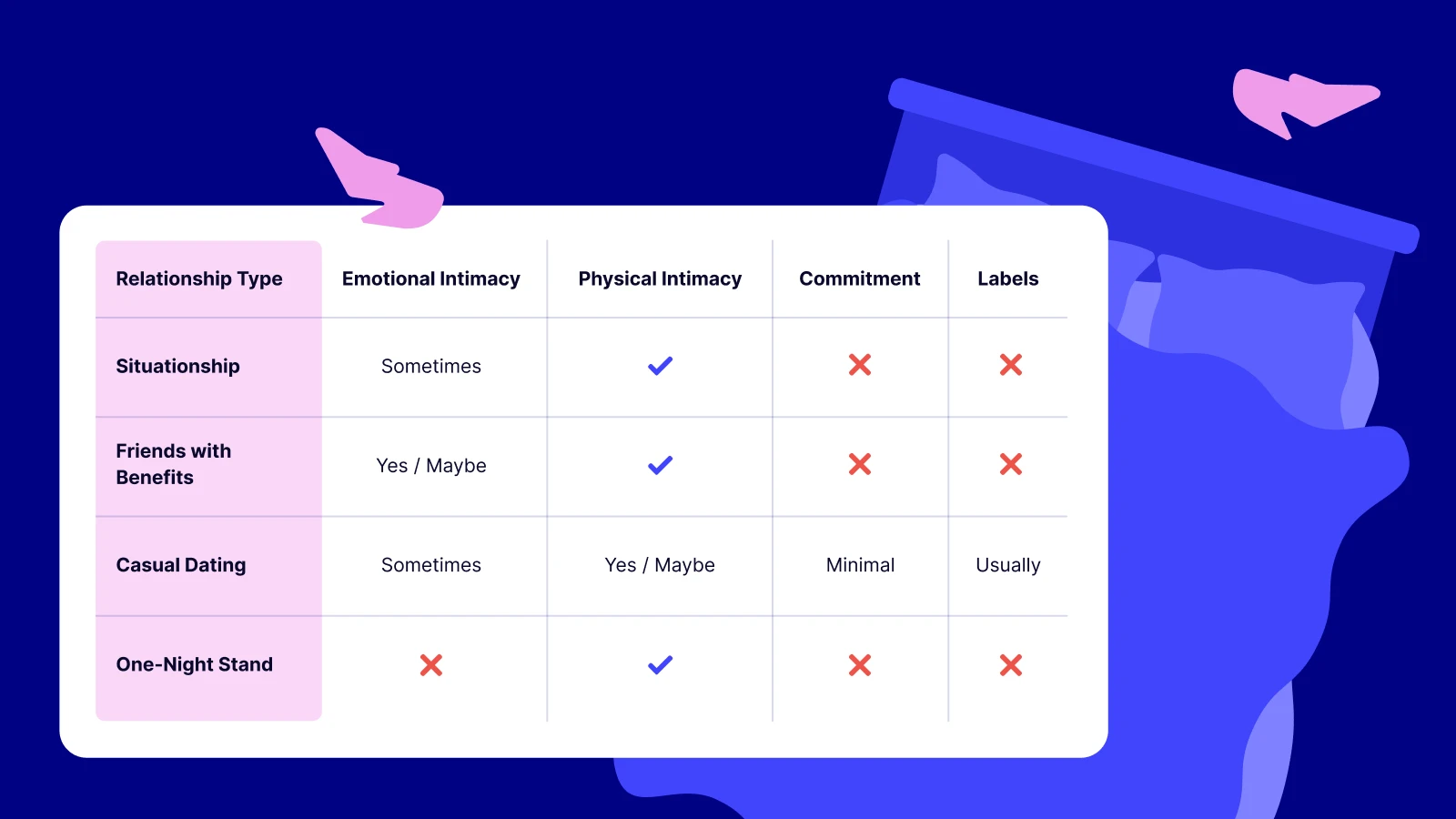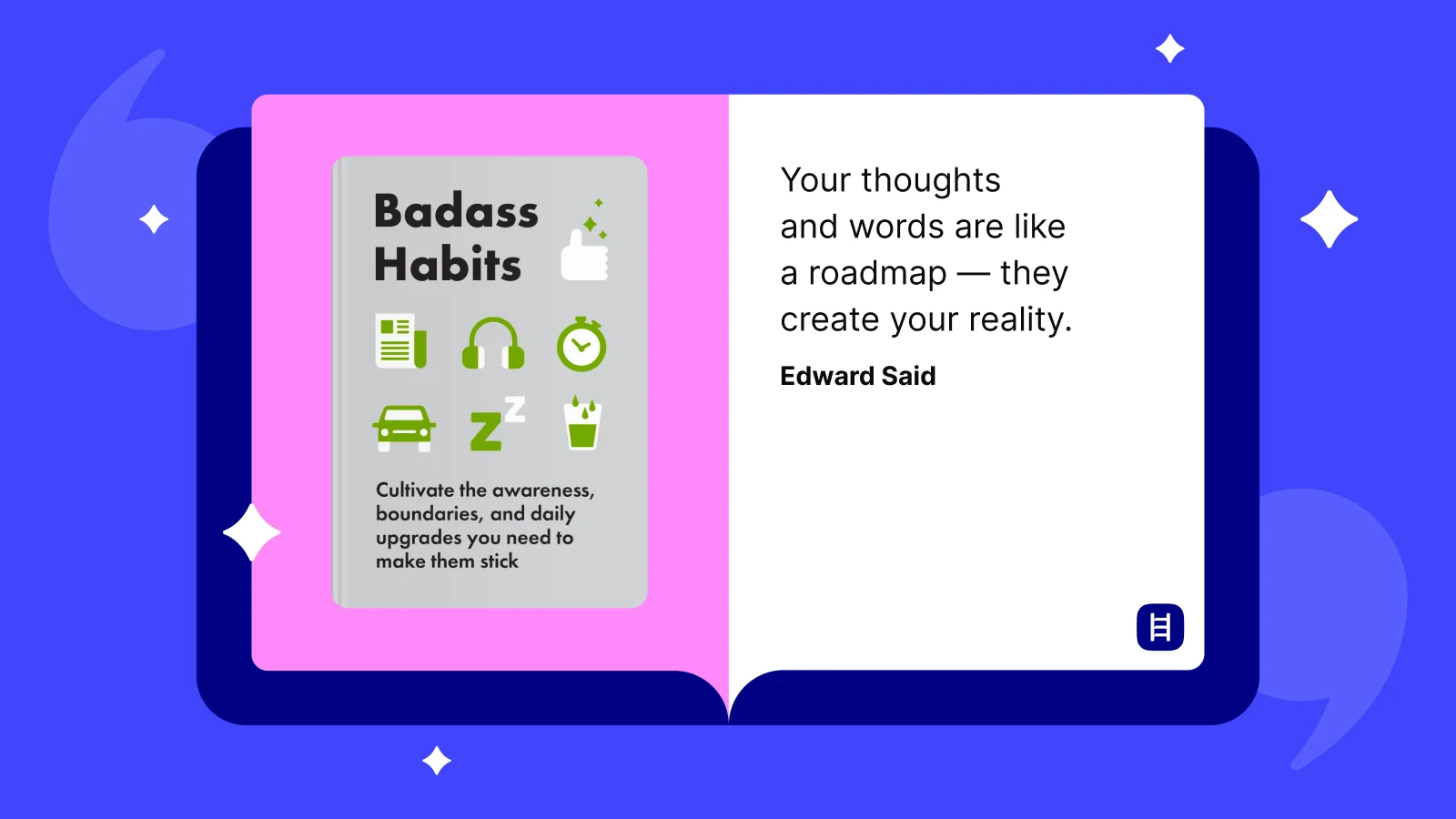If you've ever found yourself pondering, "Are we dating or …?" — you're not alone. As a relationship coach and nervous system specialist, I've helped dozens of clients who were grappling with the ambiguity of modern love release their anxiety and frustration.
In this article, you'll gain a clear understanding of the meaning of situationship, its causes, how to identify if you're in one, and how to take your next step with confidence. I'll also compare it with other kinds of relationships — from friends with benefits (FWB) to committed relationships — to help you finally make sense of your experience.
Quick answer: What does "situationship" mean?
A situationship is a romantic or sexual connection that lives in the in-between. It's more than just friendship, but it's not a clearly defined relationship either. There's closeness, maybe even deep care, but no clear commitment, labels, or direction.
Situationship meaning explained
Now, let's go a little deeper and debunk the definition of situationship. In the English language, it's a relatively new slang term to describe a romantic connection that doesn't neatly fit into traditional categories like dating.
A situationship usually involves emotional and/or physical intimacy without the clarity of a real commitment. People in situationships tend to avoid labels, solid plans, and a clear direction.
Does a situationship mean you're single?
Technically, yes — you're not in a committed relationship... technically. But emotionally, it can feel like you're involved. That gray zone is what makes situationships so confusing.
Here's what that might look like:
More than friendship, but not quite a committed relationship
Emotional and/or physical intimacy is present
Labels like “partner” or “official relationship” are avoided
Plans are rare or non-existent
Examples:
You sleep over at each other's places but have never had the "What are we?" talk.
You text often and spend weekends together, but it still feels like there's a wall between you.
You act like romantic partners in private, but there's no real public sign of commitment.
Can you turn a situationship into a relationship?
Sometimes. A situationship can evolve if both people are emotionally available and open to defining the relationship. But it takes direct communication, aligned intentions, and mutual effort, not just waiting and wishing.
Can situationships be healthy?
Yes, but only if both partners genuinely want the same thing and maintain clear communication and boundaries. The trouble starts when one hopes for more, while the other avoids clarity. Mutual honesty makes all the difference.

Why do situationships happen?
Now that we've clarified what a situationship is, let's explore why they've become so common. Situationships didn't appear out of nowhere — they're part of a bigger shift in how we connect. These days, many people crave emotional closeness but feel uncertain or hesitant about commitment. We live in a time where love is deeply valued, yet also more vulnerable and intimidating than ever.
Add to that the rise of swipe-based dating, social media comparison, and a collective sense of emotional overwhelm, and you get the perfect storm for murky connections.
Here's why so many people find themselves in situationships today:
Fear of commitment: People may avoid defined labels to protect themselves from a painful breakup.
Emotional unavailability: Trauma or unresolved issues can cause people to keep romantic relationships at arm's length.
App-based dating culture: Swiping culture promotes fast matches, short-term thrills, and low-investment connections.
Social media pressure: Constant exposure to curated dating content can glamorize noncommittal love and trigger FOMO.
Avoiding vulnerability: Situationships allow for emotional closeness without the full risk of a real relationship.
The sense of freedom in a situationship can seem exciting. But without mutual clarity, it's easy to drift in and out of something that looks like love, but never fully lands. And, sadly, you could be missing out on the real connection you're truly longing for.
How a situationship affects your well-being
Being in something undefined is frustrating and emotionally exhausting. When you're stuck in limbo, it chips away at your mental clarity, energy, and self-trust.
Here's how that often plays out:
Emotional limbo: You're always wondering where you stand, which breeds anxiety and overthinking.
Uneven investment: One person leans in, the other pulls away — creating confusion, resentment, and hope fatigue.
Energy drain: Instead of building something real, you're managing uncertainty, replaying texts, and decoding silences.
Cultural confusion: With social media glamorizing blurry love stories and dating apps fueling short-term chemistry, it's harder than ever to know what's "normal."
You might find yourself asking:
"Is this just modern dating… or am I settling for less than I want?"
It's not weak to crave clarity. It's a nervous system need, not just a romantic one. And when you're consistently unclear about your emotional safety, your body keeps score.
Eight signs you're in a situationship
These patterns aren't occasional red flags — they can point to an ongoing lack of clarity and emotional reciprocity. Look out for the following:
You've never talked about your relationship status.
Plans rarely come up.
You often feel confused or anxious.
One of you avoids deeper conversations.
Your time together feels spontaneous and undefined.
You don't feel comfortable introducing them to others.
You've tried talking about it and got vague answers.
You're emotionally invested, but things aren't moving forward.
Reminder: You don't have to question where you stand in a committed relationship. Constant confusion is a sign that you're not on the same page.
Situationship vs friends with benefits vs casual dating

These three relationship types may seem similar, but they serve very different emotional needs. Let's clear up the differences.
| Relationship Type | Emotional Intimacy | Physical Intimacy | Commitment | Labels |
|---|---|---|---|---|
Situationship | Sometimes | Yes | No | |
Friends with Benefits | Yes/Maybe | Yes | No | |
Casual Dating | Sometimes | Yes/Maybe | Minimal | Usually |
One-Night Stand | No | Yes | No | No |
A situationship can feel more intimate than casual dating, FWB, or a one-off fling, but without the trust or direction of a real relationship.
Modern relationship types decoded
Still not sure what terms like "FWB" or "casual sex" actually mean in context? Here's a quick glossary to clarify:
Situationship: A romantic relationship that's emotionally involved but undefined and noncommittal.
FWB: Friends who have sex without romantic expectations.
Casual sex: Physical intimacy without any implied emotional bond.
One-night stand: A one-time sexual encounter, often with no future contact.
Committed relationship: A clear, exclusive partnership with mutual goals and emotional connection.
Pros and cons of a situationship
Situationships aren't necessarily bad — but they're not for everyone. They work best when both people want the same kind of relationship.
Pros:
Freedom: Less pressure and more flexibility
Exploration: Great if you're figuring out what you want
Low stakes: Ideal for healing after heartbreak or a difficult breakup
Nervous system relief: Less pressure, which can help you feel safer in your body, especially if you and your partner practice clear and open communication
Cons:
Uncertainty: Constantly guessing where you stand
Imbalance: One person may want more than the other.
Emotional cost: Giving energy without knowing if it's leading to something real
Dysregulation: Anxiety, hypervigilance, and sleep issues due to your body not feeling safe or supported when you have a non-secure attachment (disorganized or anxious)
Want to protect your emotional well-being? Explore our guide on establishing boundaries in a relationship.How to handle a situationship
Is this truly what you want? If your honest answer is "no," you don't have to stay stuck. You have choices — and power.
Here are three ways to move forward:
1. Stay (with intention)Ask yourself: Is this enough for me right now? Create clear boundaries — both internally and with the other person, if you choose to stay. But make sure your choice feels empowering, not depleting.
2. Speak upClarity doesn't have to be confrontational. Try saying:"I enjoy our time together. I'd love to talk about what this means to both of us." This helps you assess whether you're truly aligned or just coasting in uncertainty.
3. Walk awayIf your needs aren't being met — if your partner can't or won't meet them — it's okay to leave.
As Dr. Sue Johnson writes in 'Hold Me Tight':
"Emotional responsiveness is the key to a secure bond."If it's not there, you're allowed to seek something deeper and more aligned."
Journal prompts and reflection questions about situationships
Writing brings clarity, especially when your thoughts feel messy. These prompts are designed to help you connect with your body's truth:
What kind of relationship do I truly want?
Where am I hoping they'll change and why?
What am I afraid will happen if I ask for more?
How do I feel after we spend time together?
What does emotional safety look like — and feel like — for me?
Where in my body do I feel confusion or calm after we connect?
Do I feel like I'm shrinking myself to stay close?
If I trusted my body's wisdom, what would I do next?
As Jen Sincero writes in 'Badass Habits':"Your thoughts and words are like a roadmap — they create your reality."Let these questions guide you back to yourself.

When chaos feels like connection
Sometimes, it's not your mind choosing the situationship; it's your nervous system. If you grew up with emotional unpredictability — love that felt conditional, inconsistent, or confusing — your body may now confuse stress with chemistry.
Familiar doesn't always mean safe. But your nervous system can see them as interchangeable.
This situation often plays out in the anxious-avoidant loop: One person reaches for closeness. The other pulls away to preserve distance. Together, you stay stuck in the space between — never truly close, never truly apart.
As Attached authors Amir Levine and Rachel Heller explain:
"The anxious person worries they aren't truly loved, while the avoidant person distances to protect their independence."
You might notice:
A pit in your stomach when they go quiet.
Compulsive checking for texts that never arrive.
Feeling on edge after time together, instead of settled.
These aren't just emotional reactions — they're survival responses. `In relationships that feel emotionally unsafe or uncertain, your body may shift into:
Fight: Criticism, snapping, emotional reactivity
Flight: Fantasizing about someone more available, emotionally checking outFreeze: Feeling numb, shut down, or confused
Fawn: People-pleasing, self-abandonment, minimizing needs
But these are not flaws. They are strategies your body learned to stay connected in unsafe emotional environments. Unfortunately, they take a toll over time.
Is a situationship toxic then?
It can be. Not all situationships are harmful — some are conscious choices. However, the "relationship" becomes emotionally unsafe when one person gets emotionally invested and the other avoids clarity. Pay attention when your body sends distress signals like:
Sleep issues and fatigue: from chronic overthinking
Hormonal or digestive shifts: from persistent stress
Low self-worth: when your needs have gone unmet
Emotional burnout: from trying to maintain a connection without direction
A moment of reflection:
Try this nervous system check-in: Sit quietly. Take a few deep breaths. Ask yourself: Do I feel more calm or more anxious after being with this person? Your body's answer — whether it's tension, relief, or a blank space — might be more honest than your thoughts.
As Bessel van der Kolk writes in 'The Body Keeps the Score':
"Being able to feel safe with other people is probably the single most important aspect of mental health."
And that includes your love life.
Book insights to understand your relationship style
Books can be powerful mirrors — helping you identify patterns, wounds, and emotional needs.
'Attached' by Amir Levine & Rachel HellerUnderstand your attachment style and how it shapes the people you’re drawn to.
'Hold Me Tight' by Dr. Sue JohnsonBuild emotional security and learn how to communicate with clarity and confidence.
'Games People Play' by Eric BerneUncover the subconscious dynamics behind your communication and relational habits.
'Badass Habits' by Jen SinceroBuild the self-worth to ask for more, or walk away from what doesn't serve you.
What social media gets wrong about love
Social media has reshaped how we think about and experience love. It's easier than ever to confuse visibility with connection.
Influencers "soft launch" their partners. Hashtags like #situationshipgoals glamorize relationships that are actually confusing and emotionally draining. Someone might post stories from their dinner date, but still dodge calling them their partner.
That's not intimacy — that's PR.
As Eric Berne reminds us in 'Games People Play':"The rules of the game are rarely conscious — we play them without realizing."
These games multiply online. And when connection becomes a performance, it's hard to tell what's real. So ask yourself:Are you building something meaningful, or just curating an image of it?
Turn confusion into clarity with Headway summaries
Being in a situationship doesn't make you foolish — it makes you human. We all long for closeness. Sometimes, we settle for a version of it that doesn't fully meet our needs.
Whether you stay, speak up, or walk away, you're allowed to want more than "almost." You're allowed to want a connection that feels safe in your body and clear in your mind.
Books like 'Hold Me Tight' can help you understand your emotional needs. If you continue to be drawn to distant or unavailable people, 'Attached' offers the insights to break the cycle.
Most importantly, remember this:
You deserve a relationship that feels mutual, grounded, and emotionally real — consistently, not conditionally.
FAQs
Does cheating exist in a situationship?
Yes — if there's an unspoken expectation of exclusivity, breaking that can still feel like betrayal. The lack of clear rules doesn't remove emotional consequences.
How long can a situationship last?
Weeks to years. Some people stay stuck out of hope or fear, while others eventually drift apart or clarify the relationship.
What is breadcrumbing?
Breadcrumbing is when someone gives you just enough attention to keep you interested, but then never commit. It's inconsistent, confusing, and emotionally draining.
Does a situationship include kissing?
Often, yes. Many involve physical intimacy — kissing, cuddling, and even sex — without a defined emotional commitment.
Why do men want situationships?
Not just men — people of any gender might prefer a situationship to avoid commitment, maintain freedom, or because they're unsure of what they want.
What is a partner in a situationship called?
There are no formal labels in a situationship. People say "the person I'm seeing" or "my maybe," or they just avoid labels altogether, adding to the confusion.
What is the 3 3 3 rule in situationships?
It's a TikTok trend suggesting: 3 days of not texting, 3 weeks of casual vibes, 3 months of nothing defined. A red flag — not a roadmap.
Should I tell my situationship partner I like them?
Yes — if it’s true. Honesty helps you clarify where you stand. If they avoid the conversation, that’s also clarity. You deserve emotional transparency.













